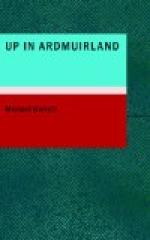Penny took quite a motherly interest in the poor afflicted fellow. Whenever he came on any errand from the Lamonts he was always given a piece of cake or fruit—anything sweet, for he had a child’s taste. But although Bildy was supremely delighted, he seldom said more than “thank you, Ma’am!” I once suggested that she should refer to Val, and the experiment was successful in opening Bildy’s mouth. After that the conversation would almost invariably run thus:
“Did you see Father Fleming on Sunday, Bildy?”
“Aye, aye! He’s the boy! Father Fleming’s the boy!”
Next to the old widow, Bildy loved the cow. She was his particular charge, and he was soon on intimate terms with her. Not only did he carry on familiar conversations with her, on his part, but it appeared that the cow made him her confidant in return. If he began to murmur something to himself as he sat by the chimney corner, they would inquire what he was talking about. It was generally arrant nonsense that he told them. Once Robina asked:
“Wha tellit ye that rubbish, Bildy?”
“The coo,” he gravely answered.
On a damp, misty morning he had gone out as usual to drive the cow out to the meadow to graze. Widow Lamont, from her place opposite the window, noticed that they did not pass out in the customary way, and notified the fact to Robina. The latter accordingly ran out at once to inquire the reason of the delay. She found Bildy quietly fastening the door of the byre before returning to the house.
“Ye havna’ fetched oot the coo!” she exclaimed. “Gae in an’ drive her oot, Bildy!”
“Na, na,” replied he, solemnly shaking his head. “She says it’s ower cauld the day. She’ll bide inside.”
Bildy’s hero-worship of my brother increased as time went by. He regularly came to Mass, and obedient to Robina’s instructions sat still and looked “straicht at Father Fleming.” On one particular Sunday, when we had a priest staying with us (an old friend of Val’s), the latter invited him to preach. This did not suit Bildy at all. After Mass he walked home alone, not waiting for Robina, who was chatting with her neighbors outside the church, and showed by his manner that something was amiss. Widow Lamont put down her book, in which she had been piously reading her “Prayers for Mass,” and accosted him with the usual formula:
“Weel, Bildy, what kind o’ preachin’ had ye the day?”
But the answer was not that which they took a simple pleasure in drawing from him usually. Bildy began to bite his hand—a trick he had when annoyed.
“That’s nae preachin’,” he cried indignantly. “Yon monnie canna’ preach! Wha’s the reason Father Fleming canna’ preach the day? Eh!” (with withering contempt.) “Sic a monnie preach!”
The diminutive, in Bildy’s phraseology, implied depreciation; that was why he stigmatized a regular six-footer as a “monnie.”




